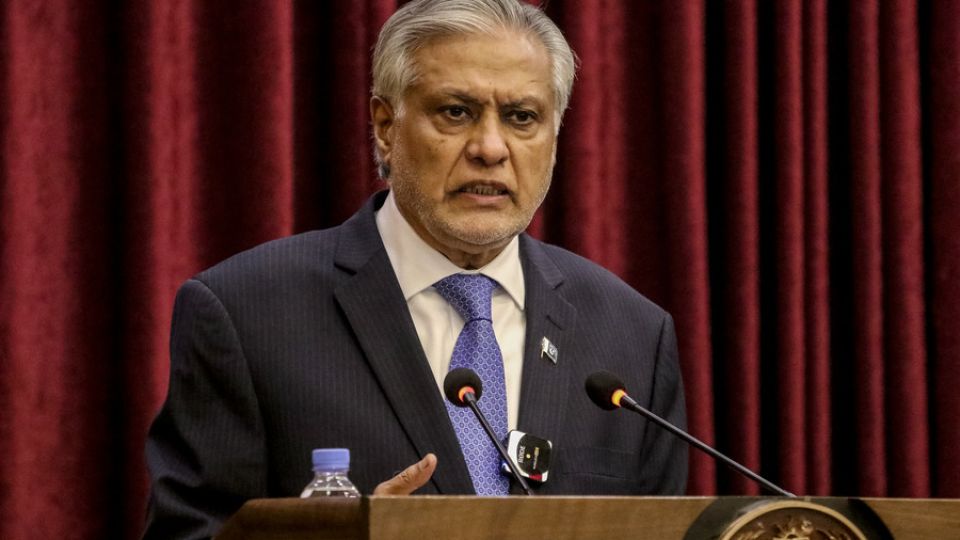May 22, 2025
BEIJING – Pakistan’s Foreign Minister Ishaq Dar met his Chinese counterpart Wang Yi in Beijing on May 20 and the two men reaffirmed the ironclad friendship binding the two countries, following a four-day crossfire between India and Pakistan earlier in May.
Mr Dar is the first high-level Pakistani official to visit China after the India-Pakistan conflict drew international attention to the reported performance of Chinese fighter jets and missiles, one of the few times they have been tested in actual combat.
Mr Wang told Mr Dar: “As an ironclad friend, China will firmly support Pakistan in safeguarding its national sovereignty and territorial integrity.”
In response, Mr Dar said Pakistan hopes to “continue to receive strong support from China in overcoming current difficulties” and in promoting national development, security and stability, said the Chinese Foreign Ministry in a statement on May 20, although arms sales were not specifically mentioned.
The reaffirmation of ties was significant as, aside from Turkey and Azerbaijan, there was little support for Pakistan during the conflict with India.
Islamabad will want to reaffirm Beijing’s diplomatic and strategic backing, especially as Pakistan faces international scrutiny for its murky role in cross-border terrorist activity, said Dr Sajjan Gohel, international security director at the London-based Asia-Pacific Foundation think-tank.
The reported good showing of Pakistan’s China-made weaponry, however, would not necessarily lead to more bilateral arms sales, analysts said.
China is Pakistan’s main arms supplier. The majority of China’s arms sales has gone to Pakistan in recent years, including J-10CE fighter jets, developed by Chengdu Aircraft Industry Group and first delivered to Pakistan in 2022.
During the conflict, those fighter jets reportedly shot down the French-designed Rafale aircraft belonging to the Indian Air Force. New Delhi had declined to confirm the specific losses.
This nevertheless triggered praise from Chinese state and social media in a supposed credibility boost for the Chinese defence industry, which still holds a small market share.
China has accounted for about 6 per cent of global arms transfers in the past five years, behind the US, France and Russia.
Professor Lin Minwang, who specialises in international relations and South Asia at Shanghai’s Fudan University, said the performance of China’s weapons would have boosted Pakistan’s confidence in them, which is naturally good for future sales.
Whether this would actually translate to more acquisitions depends on Pakistan’s military plans and needs, said Prof Lin, who is deputy director at his university’s Centre for South Asian Studies.
He said the meeting between Mr Wang and Mr Dar not only served to calm regional tensions, but also allowed both sides to push forward with the upgraded China-Pakistan Economic Corridor, with economic development still the basis of bilateral cooperation.
The corridor is a multibillion-dollar flagship infrastructure network project that links China’s western Xinjiang region with the Pakistani port of Gwadar.
On May 7, India carried out precision strikes on what it called terrorist infrastructure in Pakistan and Pakistan-occupied Kashmir, in response to an April 22 terror attack that killed 26 people.
India blames Pakistan for the terror attack, but Islamabad has denied any involvement. Both sides reached an understanding on May 10 to end the conflict.
Asia-Pacific Foundation’s Dr Gohel believes Pakistan sought further upgrades from China to its air defence systems, radar integration and missile technology after India’s strikes.
Despite the framing of successes, Pakistan faced numerous setbacks, especially as its bases were repeatedly hit from India’s stand-off capacity, he said.
At the same time, the conflict had provided “invaluable performance feedback (for Chinese weaponry) that no simulation or exercise can replicate”, Dr Gohel said.
He added that Pakistan’s substantial military upgrades, if any, will be weighed against international optics, regional balance and China’s own tensions with India.
“Any new systems offered are likely to be incremental or previously planned, avoiding moves that visibly escalate the situation,” he said.
Dr Shounak Set, a research fellow with the S. Rajaratnam School of International Studies’ South Asia Programme, said the conflict had presented China with an opportunity to enhance the reputation of its defence industry.
This was especially as persistent concerns over quality control and performance had previously affected its defence exports, he said, adding that these concerns have been informally acknowledged within Pakistan as well.
“However, the performance of the Chinese air defence systems, which struggled to prevent deep strikes and precision targeting, offers a more measured and sobering assessment of the overall operational effectiveness,” said Dr Set.
As for the overall China-Pakistan relationship, he said it is anchored in historical ties and a shared interest in counterbalancing India.
“This episode, like previous instances, reinforces the durability and strategic orientation of that relationship,” Dr Set said.
- Lim Min Zhang is China correspondent at The Straits Times. He has an interest in Chinese politics, technology, defence and foreign policies.

